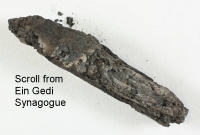
The documents of antiquity, ancient scrolls, pose all sorts of challenges for scholars trying to read them. This is especially true for the most fragile documents, those seared but not completely destroyed by fire, sometimes thousands of years ago.
But now scholars have a new resource to non-invasively read ancient scrolls without unrolling them and possibly damaging or destroying the brittle texts that provide a direct window to human experience in the ancient world.
The technology, developed by University of Kentucky computer science Professor and UW-Madison alumnus Brent Seales, was dramatically unveiled in 2015 when the Israeli Antiquities Authority revealed the text – the Book of Leviticus, the oldest copy of the Hebrew Bible outside of the Dead Sea Scrolls – from a badly burned and crumbling 2,000-year-old scroll. The scroll was recovered in the charred ruins of a synagogue at En-Gedi, an oasis on the shore of the Dead Sea in Israel.
______________________________
Professor Seales is speaking at Upper House on the UW-Madison campus Friday evening, in a special event to mark the 50-year anniversary of the Madison Biblical Archaeology Society.
.

